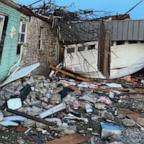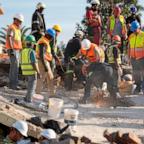NTSB urges transit systems to address 'safety glitches'
WASHINGTON -- Mass transit systems around the country could suffer from the same electrical flaw that sent a subway train hurtling into another train in June, killing nine people, investigators announced Tuesday.
The National Transportation Safety Board (NTSB) issued "urgent" recommendations calling on federal regulators, local rail operators and a rail signaling manufacturer to inspect other systems for the same problem.
"Our findings so far indicate a pressing need … to immediately address safety glitches we have found that could lead to another tragic accident (in Washington) or another transit or rail system," NTSB Chairwoman Debbie Hersman said.
The Washington Metropolitan Area Transit Authority (WMATA) uses a system that tracks where each train is located by monitoring sound waves in the tracks. It automatically commands trains to stop before a collision can occur.
The accident during the evening commute June 22 occurred when one WMATA train slammed into a second train that had stopped. In addition to the nine fatalities, 52 commuters were taken to local hospitals. Investigators said high-frequency sound signals from electronic equipment leaked into the monitoring system and tricked it into thinking that the stopped train did not exist, the NTSB said.
The operator of the trailing train tried to slam on the emergency brakes but could not stop in time to avoid hitting the stopped train.
Transit systems in some of the nation's largest cities could be affected by the same problem. In testimony before Congress in July, William Millar, president of the American Public Transportation Association, said transit systems in Boston, Atlanta, Baltimore, Miami, Philadelphia and San Francisco use similar technology to keep trains from colliding.
The Federal Transit Authority sent a letter late Tuesday to the roughly 50 local transit agencies it helps fund, urging that they "immediately" test their systems.
The Federal Railroad Administration, which mostly regulates freight lines, was studying the NTSB recommendations but expected to respond in the "most expeditious and vigilant manner possible," spokesman Warren Flatau said.




